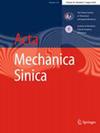Sloppiness of auto-discovered constitutive models for skeletal muscle
Abstract
Soft biological tissues are challenging materials for both testing and modeling. Despite the development of many constitutive models, the processing of choosing the most suitable model remains heuristic, relying significantly on personal experience and preference. Another issue is that the amount of collected experimental data is always finite. In this study, we trained a constitutive artificial neural network based on experimental data of cattle skeletal muscle tissue for the self-directed auto-discovery of constitutive models. The discovered models inherently satisfy thermodynamic consistency, material objectivity, polyconvexity, and necessary physical restrictions. Two constitutive models have been discovered by the trained neural network. Considering the constraints of finite experimental data, the generality and reliability of the auto-discovered constitutive models remain to be analyzed. Through experimental data of pig skeletal muscle tissue, we assess the goodness-of-fit and parameter identifiability of the automatically discovered constitutive models. At first glance, both auto-discovered models have excellent prediction accuracy. Further exploration from the perspective of information geometry suggests that one of the auto-discovered models is superior to the other in terms of parameter identifiability. The findings of the current work are expected to extend our understanding of auto-discovered constitutive models and offer a new perspective to advance machine learning-driven mechanics.

 求助内容:
求助内容: 应助结果提醒方式:
应助结果提醒方式:


